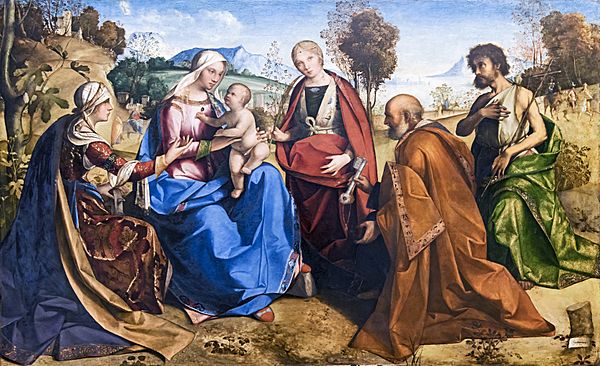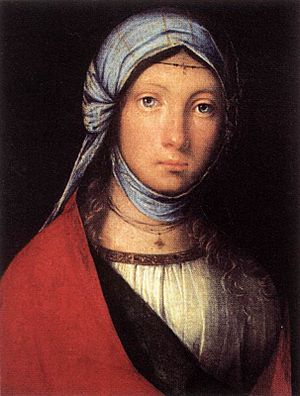Boccaccio Boccaccino facts for kids
Boccaccio Boccaccino (born around 1467, died around 1525) was an important painter during the early Italian Renaissance. This was a time when art and culture blossomed in Italy. He was part of the Emilian school of painting, which means he painted in a style common in the Emilia region of Italy.
Boccaccino is even mentioned in a famous book by Vasari called Lives of the Most Excellent Painters, Sculptors, and Architects. This book tells the stories of many great artists from that period.
Contents
Early Life and Training
Boccaccio Boccaccino was born in Ferrara, a city in Italy. He likely studied painting there, possibly with an artist named Domenico Panetti. We don't know many details about his early life.
Where He Worked
Boccaccino worked in several Italian cities. His main work was in Venice, Ferrara, and especially in Cremona. In Cremona, he started his own art school. A famous painter named Garofalo was one of his students there.
Famous Works
Boccaccino's most well-known art project is the set of frescoes he painted in the Cathedral of Cremona. Frescoes are paintings done directly onto wet plaster walls. He worked on these from 1506 to 1519. His paintings showed scenes like the Birth of the Virgin and other parts of her life story. Later, another artist named Altobello Melone took over his position there.
Other important paintings by Boccaccino include:
- Marriage of Saint Catherine (found in the Gallerie dell'Accademia in Venice)
- Virgin and Child with Four Saints (in San Giuliano, Venice)
- Virgin and Two Saints (in San Quirilo, Cremona)
- Holy Family (in the Louvre Museum in Paris)
An art expert named Luigi Lanzi said that Boccaccino's paintings were special. He liked their rich fabrics, many colors, lively poses, and beautiful landscapes. Some paintings that people once thought were by other famous artists, like Pietro Perugino or Pinturicchio, are now believed to be by Boccaccino.
His Family and Legacy
Boccaccino passed away in Cremona. His son and student, Camillo Boccaccino (1501–1546), also became a painter. He worked in Cremona, following in his father's footsteps.
Today, you can see paintings by Boccaccino in several museums around the world. These include the Milwaukee Art Museum in the USA, the Museum of Fine Arts (Budapest) in Hungary, the Uffizi Gallery in Italy, and the National Museum of Art of Romania in Bucharest.
Sources
 This article incorporates text from a publication now in the public domain: "article name needed". New International Encyclopedia. (1905).
This article incorporates text from a publication now in the public domain: "article name needed". New International Encyclopedia. (1905).
See also
 In Spanish: Boccaccio Boccaccino para niños
In Spanish: Boccaccio Boccaccino para niños
 | Sharif Bey |
 | Hale Woodruff |
 | Richmond Barthé |
 | Purvis Young |



